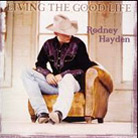November 2003
Hayden is a co-writer of eight of the disc’s 11 tracks and he has a keen ear for material by other writers that fits his style, such as the touching and succinct "Broke Down" by Slaid Cleaves: "Sherry had a pawn shop band of gold / sink full of dishes and a love grown cold / Along came a boy as pretty as the devil / Took his hand and the whole thing unraveled …." That song, "Living Every Day Like It’s Saturday Night" by Clay and Tracy Byrd, and "Delia’s Long Brown Hair" by Howard Russell Smith involve basic human struggles -- consequences of leaving someone when love fades, failing to learn life isn’t all hot cars and parties, and treating love as temporary versus long lasting. In contrast to Living the Good Life’s cover songs, Hayden’s sometimes describe contentment and sometimes pain, but they lack the moral dimension that makes for good writing or rewarding attempts at it. This fundamental weakness jumps right out of the title track. "I’m living the good life I’m happy to say / Watching the sun sink low and my cares fade away / I got a woman who loves me, oh and she’s gonna stay / I’m living the good life everyday (sic)." That is the refrain, which opens the song. Does this writer define "the good life" as being without cares and feeling that other people belong to him? The song continues: "I got a house, I got a truck / … I got a job, … I got a dog in my backyard / … There’s a place I like to go / It’s my favorite fishing hole." Hayden is apparently unaware of the implications of stating that contentment can be defined by material possessions and the means of acquiring them, having no worries, thinking of a woman and a dog as possessions, and having a place to injure and kill fish. Irony and other aspects of artistry are absent here. No nod to the age-old wisdom that the value of material things rapidly fades and that tyranny over others inevitably bites the tyrant’s butt. But couldn’t this be an aberration? It isn’t. The disc’s single, "Trying To Get a Little Love," describes essentially all of humanity as seeking love, with no one worthy of it or giving any. In "Mr. Mockingbird," the singer whines throughout about losing a woman, without recognizing anything in himself that might have caused her to leave or describing anything about her that he loves. Then he asks, "Won’t you send her back to me Mr. Mockingbird?" A comprehending mockingbird would reply, "Why would I?" To become "the perfect stone-country singer in the tradition of Haggard and Jones," as the album’s press release erroneously claims he is, Hayden will need to experience his life and his world more deeply and display a talent for putting more interesting thoughts into words. Perhaps Rodney Hayden can begin by comparing the key differences between the songs he has written and those he covers. GO BACK TO: |
 Rodney Hayden - Living the Good Life
Rodney Hayden - Living the Good Life Rodney
Hayden’s second album, Living the Good Life, spotlights a young country music
performer with a fine singing voice and some songwriting ability that he would do well to
develop as his vision of humanity and his values mature. The backup musicians are
dedicated and skilled, and the disc is nicely recorded. The problem is one of substance.
Rodney
Hayden’s second album, Living the Good Life, spotlights a young country music
performer with a fine singing voice and some songwriting ability that he would do well to
develop as his vision of humanity and his values mature. The backup musicians are
dedicated and skilled, and the disc is nicely recorded. The problem is one of substance.